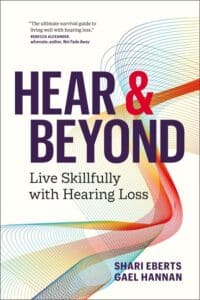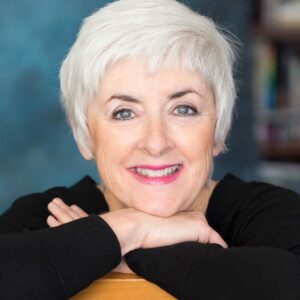
This week’s blog is written by Gael Hannan. Gael is an adult with a progressive hearing loss which began when she was a child. I asked her to write this blog because she writes very well about her experiences learning to advocate for herself as a young adult. As those of you who read my blog know, I feel strongly that we need to help children with hearing loss learn to advocate for themselves.(In addition, Gael has been a writer for HHTM for many years at the Better Hearing Consumer)
The long and protective arms of parents can reach only so far.

I learned this when, leaving home as a hard of hearing child, I found myself an adult and responsible for my own hearing loss needs. My parents no longer my advocates.
But there was no operating manual for me to follow. I was on my own with only a faint road map. It has taken decades but now, as a hearing loss advocate, speaker and writer, I have written the book that I needed back then: Hear & Beyond: Live Skillfully with Hearing Loss, co-authored by fellow advocate, Shari Eberts.
I grew up with hearing loss at a time when resources for children were minimal, almost non-existent.
The prevailing wisdom of the day was to not put a body aid on a child whose hearing loss was mild (at the time). My parents filled the gaps the best that they could, encouraging good communication practices – to focus on what was being said and to slow down my own rapid-fire and sometimes unclear speech. Sibilant sounds were difficult because I couldn’t hear them, and I often dropped consonants off word endings for the same reason. They taught me to let people know what I needed. My teachers were advised about my challenges – by my parents in primary and middle school and by me I high school and beyond.
Leaving Home
One of the first things I did after leaving home was to go to a new doctor. It was a life-changing decision because I had a hearing aid within a month. But even with this miraculous piece of technology, navigating adulthood with its working life, dating and other social practices, was often challenging due to my hearing loss.
I didn’t take the baton from my parents and become a strong self-advocate, even though, for the first time, the reality sank in of how much I did not hear; my progressive loss was now moderate and just a few years from becoming severe to profound. But my communication boo-boos were embarrassing. I tried to hide my hearing aid and my hearing loss. And while I had become an ace speech-reader, I also became adept at bluffing my way through difficult listening situations, although there are always consequences.
Over time, as I matured, I became better at self-advocacy; having my needs met depended on it! Still, I operated in a vacuum – I knew almost nothing about hearing loss, including my own, and I didn’t know a single other person who had it, except for my elderly great-grandmother who had a voice like a foghorn and wouldn’t admit she didn’t hear well.
Nothing much changed until I was 40. I was expecting a baby and for the first time, my hearing loss worried me. How would I hear my child crying in the night? What if I didn’t hear him burp – would he blow up? In a brave move, I reached out to other people with hearing loss and life changed again. I went to a hearing loss conference, where a wonderful woman, another mother, sat down with me and calmed my fears. I walked into the conference as one person and walked out another. The memory that still gives me a tingle.
From that day on, I soaked up all that I could about hearing loss. I adopted a wide variety of new skills and technical devices, and I became passionate about explaining the impact of hearing loss on our lives – and how those lives can be better.
Taking Responsibility for my Own Hearing Loss Journey
When I took responsibility for my own hearing loss journey, it improved! The hearing itself didn’t improve (an understatement), but how I felt about and managed it did. Today, I use a variety of integrated strategies – mental, technical, interpersonal, establishing support networks – that improve communication, not just better hearing.
As parents of children with hearing loss, or as hearing healthcare professionals who work with them, you know that their journey is personal. You do what you can, and then they are on their own.
Hear & Beyond is the “operating manual” that neither Shari nor I had in our young adulthood – but wish that we did. Our stories are woven throughout the book, as are the Big Picture of hearing loss, the strategies, and an entire section devoted to usable Hearing Hacks.
We wrote the book for people on their hearing loss journey – regardless of what point they are at – and their families and hearing care providers. Hear & Beyond: Live Skillfully with Hearing Loss is recommended by leaders in the hearing health field and, more importantly, by people with hearing loss.







